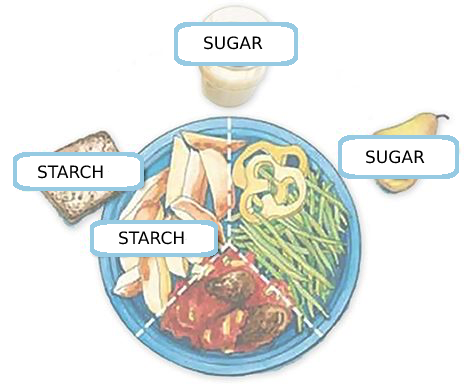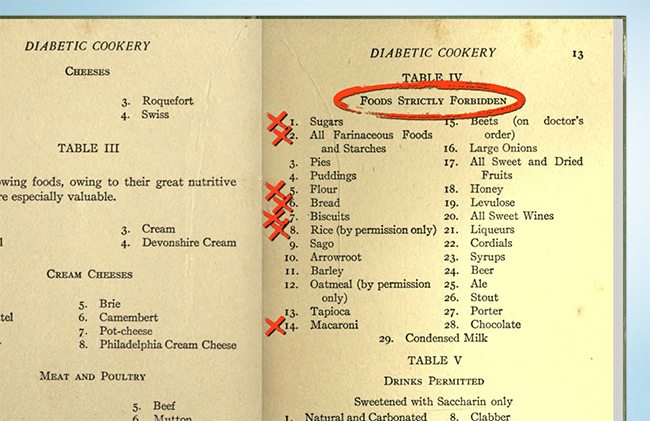

Dietary recommendations for nutritionists have been similar for decades. More and more people developed diabetes during this time, and the patients’ condition continued to deteriorate. Nonetheless, they were frequently advised to eat meals high in blood sugar-raising carbohydrates.
Here is an example of a meal recommended for diabetics:

Which components of the meal raise blood sugar levels? Of course, those that contain carbohydrates (sugar and starch).
Bread and potatoes contain starch, milk contains lactose, and fruit contains pure sugar in the form of fructose.

The above-mentioned meal significantly raises blood sugar levels. A diabetic will not become healthier or slimmer by eating this way. On the contrary, such a diet will require the use of even more medications, and also progressively develop obesity.
The proposed meal will have the opposite effect of what is desired. Furthermore, there is no scientific support for such a meal composition.
On the contrary, studies in recent years show that a diet rich in carbohydrates increases the risk of diabetes and worsens the results of already diagnosed ones in the long run.
The only reason to continue using this model of nutrition is the irrational fear of fats. More carbohydrates are required to achieve satiety. In recent years, the old theory about the dangers of fat has been debunked. Low-fat foods are unnecessary.
Is there an alternative to improve my health? Is there any food that doesn’t raise blood sugar?
What should we eat if we reject foods that raise sugar levels? Let’s have a look:

More and more diabetics choose to eat foods low in carbohydrates and high in fats.
They usually see an improvement in blood sugar scores and a reduction in the need for medications, especially insulin. There is also a significant loss of weight, an improvement in overall well-being and test results.
This nutrition model based on the consumption of low carbohydrates is recommended by an increasing number of physicians.
The discovery of a low-carb diet is nothing new. Before the invention of drugs to lower blood sugar and the widespread fear of consuming fats, dietary recommendations for diabetics looked very different than they are today. Diabetics could only be helped by following a healthy diet.
Below are pictures from the 1917 diabetic cookbook. The entire book is available online for free at http://archive.org/details/diabeticcookeryr00oppeiala/. Here is a summary of the foods diabetics should eat and those to avoid.
Let’s start with products that were not recommended for diabetics 100 years ago.
The title of the page is “Foods Strictly Forbidden”. The list starts with sugar as well as flour and starch products. Here are their examples:
Although they are completely banned, today they constitute a major part of the diet recommended for diabetics. As a result, diabetics require an increasing number of medications, and their disease worsens. There is no such thing as coincidence.


Here’s a short list of the recommended products with high nutritional value: butter, oil, cheese, meat, fish, eggs. If we add vegetables to this list, it turns out that this set corresponds with the effective and extremely healthy keto diet that we recommend.
Today’s dietary recommendations for diabetics are based on a high-carbohydrate nutrition model and long-held fears of fat consumption. However, there is no scientific evidence that this diet has any health benefits.
Research on low-carbohydrate diets is scarce so far. However, those that have already been carried out clearly show that it brings much better results than the still often recommended low-fat diet.
In many studies, people with diabetes are still advised to eat products that slowly raise blood sugar levels: fruit, rice, pasta, potatoes, and bread.
What good can this do for someone with diabetes? Does anyone make money from this?
The answer is simple: pharmaceutical companies. After all, they are producers of drugs that lower blood sugar. This is not a conspiracy theory, it is simply market realities. The scale of this phenomenon should be realized by the fact that around the world there are roughly 400 million people suffering from diabetes.
Receive tips, articles and all the goodies absolutely free, straight to your inbox!